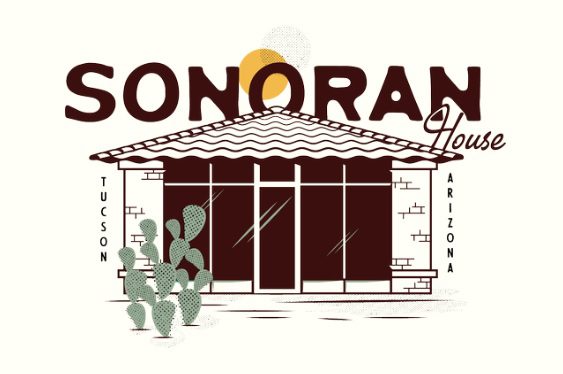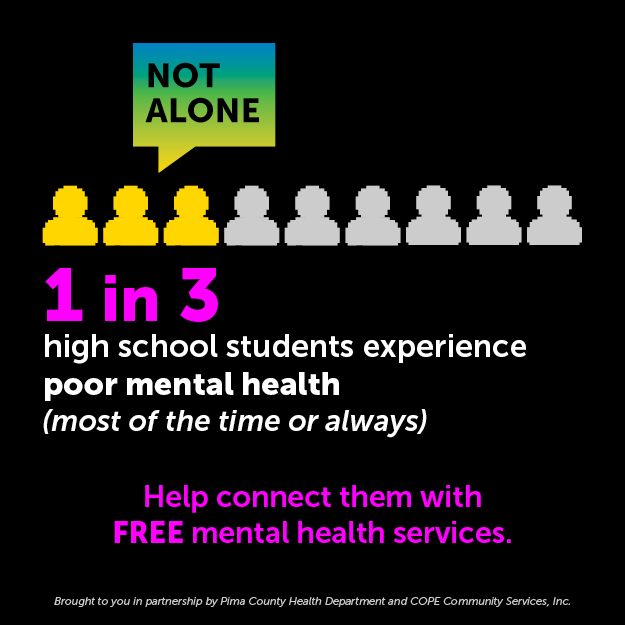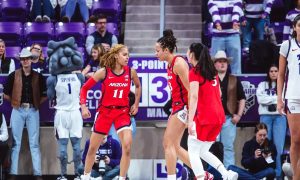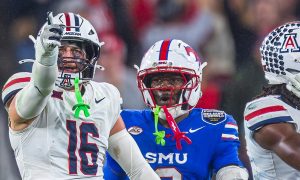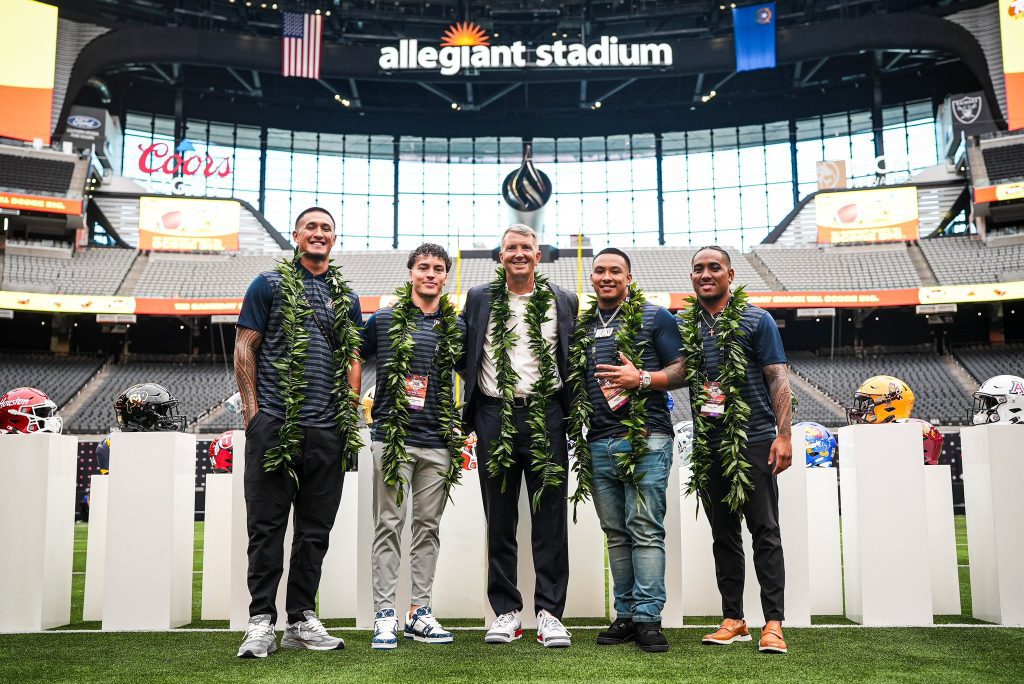
LAS VEGAS — The leaf leis worn by Arizona coach Brent Brennan and his players Tetairoa McMillan, Noah Fifita, Jacob Manu and Gunner Maldonado at Wednesday’s Big 12 Media Days were a bold statement of the Polynesian family bond that exists within the program.
McMillan’s mother Shawny made the leis and transported them from her home in California, keeping the leaves fresh in a cooler. She presented the leis to her son and Arizona’s contingent at the lobby of the Bellagio, where they stayed here for the Big 12 Media Days.
“Super cool — it’s always an incredible honor when the mother of a Polynesian player gives you one of these,” Brennan said. “I am super honored to wear it. … Just an awesome woman. Those players are really, really special kids and it’s awesome. Everyone was excited to wear it.”
Brent Brennan press gathering after he was on stage. Asked Brennan about the leis worn by himself, Tetairoa McMillan, Noah Fifita, Gunner Maldonado and Jacob Manu to Big 12 Media Days. McMillan’s mom Shawny traveled from California after putting them together and kept them in a… pic.twitter.com/Yc1D9Hl7qo
— Javier Morales (@JavierJMorales) July 10, 2024
Arizona’s coaching staff includes Polynesians Duane Akina (defensive coordinator), Joe Seumalo (defensive line) and Lyle Moevao (quarterbacks).
Brennan has a background of embracing the culture when he was an assistant at Hawaii and was part of Tomey’s staffs at Arizona and San Jose State.
Brennan mentioned that Tomey brought the widespread recruiting of the Polynesian community to Arizona “because he was one of the first guys to recruit American Somoa, Fiji, Tonga — all those places — because of where they were at the University of Hawaii. When he came to Arizona, that became part of our team at Arizona.”
“It’s been awesome to see that culture’s impact on the game of football,” Brennan added.
“Brent Brennan is awesome. I love that guy.” — BYU coach Kalani Sitake on Arizona’s coach who will take the Wildcats to Provo on Oct. 12. #Big12MediaDays pic.twitter.com/LU4AgFa7ao
— Javier Morales (@JavierJMorales) July 10, 2024
BYU coach Kalani Sitake is a Polynesian who is widely respected within that community as the first person from Tonga to be a college head coach. He said of Arizona’s new coach: “Brent Brennan is awesome. I love that guy.”
His full name is Kelaokalani Fifita Sitake.
“I love Kalani; we worked together at Oregon State (as assistant coaches),” Brennan said. “We’ve known each other as young assistants in the Pac-12. We were fast friends. He’s an awesome coach.
“I was with him when he got the BYU job (in 2016). We were in a five-day stretch that we were in Texas and California recruiting. He’s taking phone calls and I’m in the car. He’s like, ‘I’ve gotta tell you what’s going on.’ I’m sitting there hearing his half of the conversation. It was like, ‘What’s up?’ But, yeah, we lived in the same neighborhood at Oregon State. Our kids ran around together and we spent some time together socially. We just love that family.”
Manu, with his Polynesian nickname “Nuku,” on a necklace, said his culture that stresses family values resonates with all the players, not only those who have that ethnic background. He said the program does not have players who are in different cliques because of it.
Jacob Manu addresses questions about the Polynesian culture with the team, what it’s like being coached by Duane Akina and AD Desiree Reed-Francois’ claim that he is a top-notch pickleball player. pic.twitter.com/dal87l6Ub4
— Javier Morales (@JavierJMorales) July 10, 2024
“I feel like Arizona is embracing us and our Polynesian culture is starting to grow, which is good,” Manu said.
He looked at the camera and said, “All you Poly recruits out there come with us, let’s go.”
Brennan understands the value Polynesian recruits bring not only with their talent but with their character, strengthened by their upbringing.
The cultures which fall under Polynesia include Native Hawaii (United States), Samoa, American Samoa (United States), Tokelaua (New Zealand), Tahiti (French Polynesia), Fiji, and Tonga, among others.
In most Polynesian cultures, relationships are vital to success. Trust is built through a culture of hospitality and a prioritization of community. A strong sense of respect for elders is also widely instilled from a young age. Polynesian cultures value a focus on collective effort as well. For example, in Samoan culture, the word “fa’a-Samoa” is used to indicate the high importance of the dignity and achievements of the collective, rather than on individual achievements.
“I love how much they respect their parents, how much they respect each other, how much they respect their coaches,” Brennan said. “I think they add an incredible family component to the football program.”
Brent Brennan talked about how his straight-forward endearing personality strengthened his bond with Arizona’s returning players, including those deep in the Polynesian culture with Brennan’s background in Hawaii and with the late Dick Tomey (who embraced that culture dearly). He… pic.twitter.com/97J04PpjHV
— Javier Morales (@JavierJMorales) July 10, 2024
Fifita is one who is admired by many youth football players in Southern Arizona because he has helped coach or mentor many of them despite his young age while still attending college.
The youth gravitate toward him because of how he conducts himself professionally and expresses hard work will lead to potential success.
“I’m honored to have that reputation for all the Polynesian kids kind of looking up to me, as well as all the Filipino kids,” Fifita said. “It’s a blessing. I used to look up to guys as well. Being in that position now is a blessing and something I don’t take lightly.”
Noah Fifita: “You’re going to see a lot of passion. We love each other. We love playing the game.” pic.twitter.com/Bdwenn3Y9W
— Javier Morales (@JavierJMorales) July 10, 2024
When Brennan and former Arizona defensive lineman great Joe Salave’a were part of Tomey’s staff at San Jose State from 2008 to 2009, they also went on recruiting trips together.
Brennan recalled a time he was with Salave’a at East Palo Alto, Calif., and they ate Lu.
“Tongan deal, it’s like corned beef wrapped in a taro leaf that they steam,” Brennan said. “It’s like the size of a football. I was so full when we left. I was dying. I was eating with big Joe Salave’a.”
Brennan’s background mixed with the enriching qualities of Polynesian culture, in terms of a strong sense of family, from many of his leaders on the team such as Fifita, McMillan, Manu and Jonah Savaiinaea has benefited his transition from San Jose State to Arizona after replacing Jedd Fisch as head coach.
“That (Polynesian) community has been such a huge part of my life,” Brennan said. “It’s also helpful for those players to be able to call someone they know who played for us and to have someone in that community say they trust me or they trust our staff. In that community, it’s incredibly powerful.”
FOLLOW @JAVIERJMORALES ON TWITTER!
ALLSPORTSTUCSON.com publisher, writer and editor Javier Morales is a former Arizona Press Club award winner. He is a former Arizona Daily Star beat reporter for the Arizona basketball team, including when the Wildcats won the 1996-97 NCAA title. He has also written articles for CollegeAD.com, Bleacher Report, Lindy’s Sports, TucsonCitizen.com, The Arizona Republic, Sporting News and Baseball America, among many other publications. He has also authored the book “The Highest Form of Living”, which is available at Amazon. He became an educator in 2016 and is presently a special education teacher at Sunnyside High School in the Sunnyside Unified School District.


